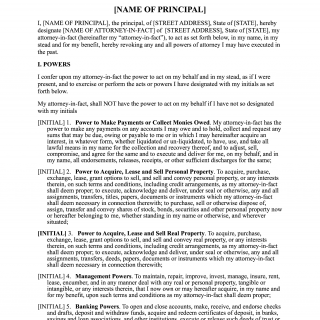Power of Attorney form Idaho
Idaho is a state located in the northwestern region of the United States. Like other states, Idaho has its own set of laws governing legal matters such as powers of attorney.
A power of attorney (POA) is a legal document that authorizes someone else, called an agent or attorney-in-fact, to act on your behalf in certain situations. This can include financial transactions, medical decisions, and other important matters. In Idaho, the laws regarding powers of attorney are found in Title 15, Chapter 12 of the Idaho Code.
One of the key requirements for a power of attorney in Idaho is that the principal, the person who is granting the authority, must have capacity at the time the document is signed. This means that the principal must be of sound mind and able to understand the nature and consequences of the document they are signing.
Idaho law also requires that the power of attorney document be signed in the presence of two witnesses or a notary public. This helps to ensure that the document is authentic and that the principal was not unduly coerced or influenced when signing it.
It is important to note that there are different types of powers of attorney in Idaho. A durable power of attorney remains in effect even if the principal becomes incapacitated, while a non-durable power of attorney terminates if the principal becomes incapacitated. An agent under a power of attorney may also have limited authority or broad authority depending on the specific terms of the document.
In addition, a power of attorney in Idaho can be revoked at any time by the principal as long as they have capacity to do so. This can be done by executing a new power of attorney, by physically destroying the document, or by providing written notice to the agent and any third parties who may have relied on the authority granted in the document.
In Idaho, several types of power of attorneys (POAs) are available. Typically, estate plans include two POAs: the financial POA and the medical POA. The former enables someone to manage your financial or business matters, while the latter empowers someone to make medical decisions on your behalf. In Idaho, the medical POA is combined with a living will to form a single document called a "Living Will and Durable Power of Attorney for Health Care." Generally, these POAs are considered durable, meaning they remain effective even if you become incapacitated. Creating these documents is advisable to plan for unexpected situations.
To make a valid POA in Idaho, certain requirements must be met. Firstly, the person making the POA must be of sound mind. Secondly, although not mandatory, it's recommended to get the POA notarized. The POA must be created using a statutory form, software, or an attorney. Once completed, the original POA should be stored in a safe place that can be easily accessed by loved ones. A copy should also be given to the agent appointed in the POA and filed with the Recorder's Office. If the POA grants the agent the power to deal with real estate, a copy should be filed in the land records office in the county where the property is located. Additionally, copies of the durable financial POA can be given to banks or other institutions that the agent may need to deal with in the future.
When choosing an agent to serve in a POA, any competent adult can be named legally. Other practical considerations such as trustworthiness and geographic location should also be taken into account. Appointing co-agents at the same time is allowed, but it is usually advised to stick to only one agent to avoid potential conflicts. However, having an alternate agent who becomes the agent if the first choice is unavailable is always a good idea.
In Idaho, a POA becomes effective immediately unless it explicitly states that it takes effect at a future date. A durable POA automatically ends upon death, revocation by the principal as long as they are mentally competent, or invalidation by the court due to mental incompetence when signed or fraud/undue influence. Divorce also automatically ends a spouse's authority as an agent in a POA.
Overall, a power of attorney can be a powerful tool for managing important legal and financial matters. If you are considering granting a power of attorney in Idaho, it is important to consult with an experienced attorney who can help ensure that your document is properly executed and meets your specific needs and goals.

